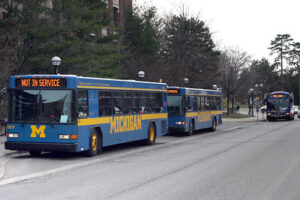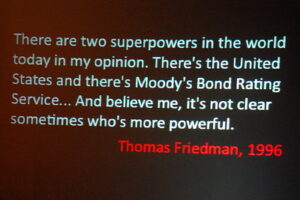In the most recent WCC Board of Trustees meeting, WCC CFO Bill Johnson provided insight into the proposed budget for the coming fiscal year. At one point, he covers the assumptions that have gone into the community college budget for FY 22. I’ve been watching this process for several years, and one thing has stuck with me. Johnson’s projections have never been very accurate, and he rarely identifies a factual basis for them. In the following clip, he walks through the revenue projections for FY 22.
Community college budget assumptions
Some of the key assumptions in our revenue budget line items. So we are forecasting about a 6% decline in credit hours for Fall from budget of this year to budget of next year, and about a 4% decline for Winter.
So, we have forecasted conservative on the revenue side. If you were to ask me how our Fall looks right now, we’re actually up, we’re actually up about 12 percent. But we think that a good part of that is just timing. And also a little bit is temporary because of the State funded programs. But we all know that those are at risk, based on what’s being proposed in Lansing, which is to defund the Reconnect and the Future for Frontliners effective October 1st. So, we think going with a more conservative 6% decline is a fair way to look at what might happen for this Fall, uh, on that side.
We’ve already talked about tuition rates and being able to keep our in-district rates level from year to year. Property taxes are actually up 4%. The County issued their final assessed values and Headlee adjusted property tax rates and those are up 4% and we are so thankful for that. That really helped the College to offer a balanced budget for this year.
Our assumption on state aid is level from year to year. And quite frankly, the recommendations, the Governor’s recommendation, which is a 2% increase. The Senate’s recommendation is no increase. The House recommendation is a 2% increase up, but with a big change in the allocation of funding. We think staying level as a budget assumption is a fair way to think about next year on State aid.
Fall enrollment is up, so why wouldn’t we predict declines?
Fall enrollment is up 12% from this time last year, but Johnson somehow turns that into a 6% decline in tuition and fees revenues. His prognosis for Michigan Reconnect and Futures for Frontliners is – charming. While Futures for Frontliners was initially paid for using discretionary federal funding, Michigan Reconnect was authorized by the State of Michigan just months ago with broad bipartisan support.
The entire Legislature is highly unlikely to defund these programs as Johnson suggests. The Michigan House Republicans stripped program funding in their budget proposal because they need to make some deals with the Governor ahead of redistricting. Why compromise when extortion works just as well?
The issue is the Governor’s request to guarantee two years of funding in the community college budget. The Legislature does not normally commit program funds over multiple budget years, but that is not absolute.
What is not in question is that the Michigan Reconnect program accepted 62,000 Michiganders, and they must enroll in classes this calendar year. That’s an average of 2,200 students per community college. (Not all applicants will be attending a community college, but the numbers provide insight into the scope of the program.) And that doesn’t include the Futures for Frontliners applicants.
Why aren’t the WCC Administration and the Board of Trustees applying pressure to the Michigan House Republicans to fund two programs that have increased Fall enrollment by 12% so far? That’s an increase in enrollment of about 1,300-1,400 students. Shouldn’t the Board of Trustees ask the Michigan GOP to set politics aside and provide community college budget support for programs that are critical to the economic recovery of the State?
These are the people we elected to speak for us. Why are they silent on this issue?
Photo Credit: Martin Abbeglen , via Flickr























